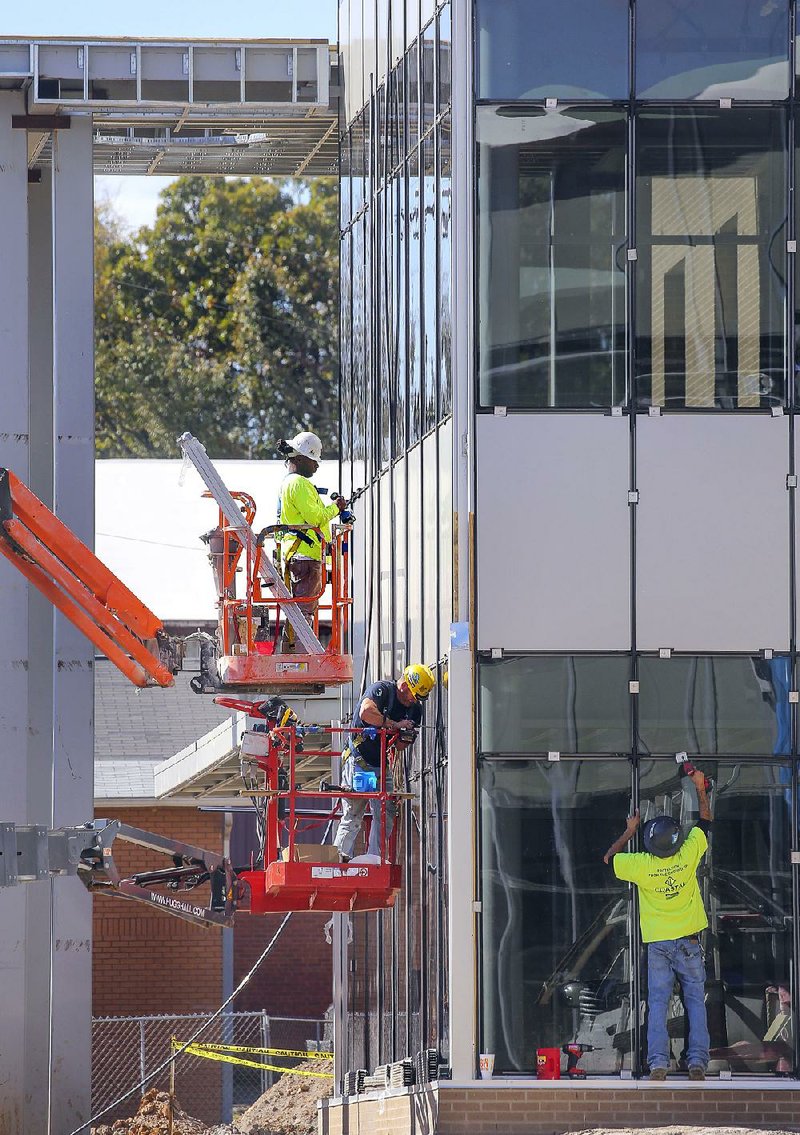Attorneys for black students known as the Joshua intervenors asked a federal judge Tuesday to appoint an expert to evaluate the quality and equity of school facilities in the southeast part of the Pulaski County Special School District versus Robinson Middle School in the west.
The request to U.S. District Judge D. Price Marshall Jr. for an independent facilities expert comes after the school district reported in recent weeks that it had fallen millions of dollars short of its commitment to spend $55 million on a new Mills High School and the relocation of Fuller Middle School to the current Mills campus.
District leaders have offered assurances that the $55 million commitment will be met -- but they also said that doing so will put the district $20 million over its total $80 million construction plan for Mills/Fuller and Robinson.
Marshall is the presiding judge in a 34-year-old Pulaski County school desegregation lawsuit in which the Pulaski County Special and Jacksonville/North Pulaski districts are subject to court monitoring of their desegregation efforts.
Those efforts include equalizing older campuses -- such as Mills and Fuller that serve areas with relatively high percentages of black and/or low-income families -- with newer schools in affluent and predominantly white areas such as Maumelle and the Chenal Valley area of west Little Rock.
The Pulaski County Special School District "acknowledges deviation from the requirements of the court's Jan. 12, 2015 Order, but asserts that full compliance is on the way," the Joshua attorneys told Marshall in a document in which they accused district leaders in 2016 of racial discrimination, deception, violating court orders and, "in effect, draining the required pool of funding for the Mills-Fuller work to complete the Robinson-area work."
"Too much has occurred for the court and Joshua intervenors to rely upon assertion," attorneys John Walker and Austin Porter of Little Rock and Robert Pressman of Lexington, Mass., wrote to Marshall. "Joshua's analysis demonstrates that the multi-prong relief which Joshua proposes is necessary to ensure compliance with the equity standard set forth in Plan 2000, Section H."
Plan 2000 is the district's court-approved desegregation plan.
In addition to asking for a federal court hearing on the school building issues and for an independent facilities expert to be paid out of district funds, the attorneys asked the judge to require the school district to produce plans for replacing College Station and Harris schools.
College Station Elementary in the southeast part of the district and Harris in the McAlmont community north of the Arkansas River are not on the district's drawing board despite their old ages and their high enrollments of pupils who are black.
The intervenors also are asking the judge to require from the district:
• A report from the architect and others on the district's construction team on how they can use the money now available for Mills/Fuller to produce school buildings of the quality that would have been possible had the proper amount of funding been available at the outset of the projects.
• Regular progress reports -- perhaps every 30 days -- on the construction of the Mills/Fuller projects with up-to-date expenditures.
• One or more reports on how the school district will equip the Mills multipurpose facility with the natural lighting features found in the Robinson facility, along with other features that have been provided by private funds for the Robinson facility that are not included the Mills multipurpose building.
• An explanation of how the district will address the fact that Robinson Middle and High schools now share a new multipurpose facility while there is no similar benefit for middle school students in the southeast section of the district.
Janice Warren, interim superintendent of the Pulaski County Special School District since July, said Tuesday afternoon that students from both Mills and Fuller will have access to the multipurpose facility. That is contrary to the Joshua findings.
Warren said she had not yet reviewed the Joshua attorneys' report, but she affirmed the district's commitment to spend $55 million on the Mills and Fuller projects.
While the district's building costs will increase from $80 million to about $100 million for the Mills/Fuller and Robinson projects, Warren said she and her staff are meeting with consultants to identify ways to absorb the costs, which is likely to include the use of savings in the district's operating budget. She also predicted that the district will have to forgo awarding raises to employees this year.
Sam Jones, the district's attorney in the long-running school desegregation lawsuit, said Tuesday that the Joshua attorneys' report is both a response to the district's own report and a motion seeking specific actions.
"That is something that the School Board will have to have a while to think about and then give me instructions on how to respond," Jones said about the proposed facilities expert and any plans for new elementary schools.
Jones said he is likely to ask the judge for time to submit a response to the Joshua motion after Margie Powell, who is the judge's expert in the desegregation case, submits her own report on the building issue. The judge has asked Powell to do that by Nov. 8.
"It will be important to see what Ms. Powell has to say before the [School Board] takes a position on this," he said.
In the Joshua report to the judge, the attorneys recounted how in 2011 a federal judge found that the Pulaski County Special district gave more favorable treatment to the predominantly white Chenal Valley and Maumelle areas in regard to new schools, leaving children in predominantly black neighborhoods "to attend older and smaller schools that are less instructionally functional and are less aesthetically attractive."
In late 2014, the district and Joshua intervenors filed a joint motion to the court on how to equalize the school buildings.
That motion established a Plan A that was conditioned on voter approval of a tax increase that would allow for some $240 million in new construction and renovation throughout the district, and a Plan B that provided only for $55 million for the Mills and Fuller projects if the millage proposal was defeated, which it was.
The district issued second-lien bonds to raise $56 million in March 2015 for the Mills and Fuller projects.
In March 2016, the district's then executive director of operations, Derek Scott, directed the building team to work toward a $35 million budget for the Mills project, well below the $55 million initially conveyed to the court.
That was changed almost immediately when then Superintendent Jerry Guess and Arkansas Education Commissioner Johnny Key -- acting as the district's school board -- approved a recommendation for construction of both Mills and Robinson for a total of $80 million, or $40 million each.
The Joshua attorneys said in the Tuesday report that their recent requests for the $40 million budgets for each project yielded no such budgets and "no breakdown showing a departure from the $35 million."
In September 2016, Guess, at a status conference with Marshall, described the plans for Robinson and Mills, saying that he had "essentially" described Plan B.
"This was inaccurate," the Joshua attorneys wrote in Tuesday's document because Plan B did not include the Robinson project.
At the same 2016 status conference, Guess said that plans for replacing the College Station and Harris schools were not moving forward because they were part of Plan A, which had been dependent on a property tax increase.
"This testimony evidenced racial discrimination," the Joshua attorneys wrote. "Failure of the millage vote sidetracked projects in the African-American community, but not an expansive project in the white community."
Guess said at the status conference that the cost of Mills/Fuller and Robinson Middle projects would be $80 million, or $40 million each.
The Joshua attorneys argued Tuesday that even if there was a $40 million budget for the Mills/Fuller project, the amount was well below the amount approved by the court in January 2015 for the Plan B projects.
A Section on 10/25/2017


